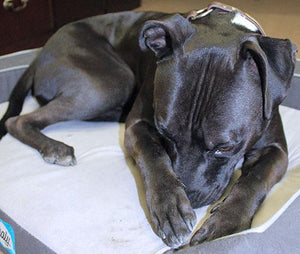How Can You Tell if Your Dog Has Colitis?
Colitis, also known as large bowel diarrhea, is an inflammatory reaction in the colon. Typically, colitis in dogs is a one-off experience that can be resolved within a few days. It’s important to know the causes, symptoms, and treatments of colitis in dogs to know what to look out for and when your dog might require medical attention.

Causes of Colitis in Dogs
There are a lot of varying causes of colitis in dogs. Colitis can be caused by stress, eating something unusual, a gut infection, worms, or other parasites. Some dogs develop chronic colitis from Irritable Bowel Syndrome, food allergies, an ongoing gut infection from bacteria or parasites, or autoimmune disease.
Stress is a common cause of colitis in dogs, and can be triggered by a number of factors including a traumatic event, moving homes, or other environmental disturbances.
The resulting inflammation in the colon reduces water absorption and decreases the ability to store feces in the colon. In turn, this leads to frequent, small amounts of diarrhea that sometimes has mucus or blood.
There are a few measures you can take to prevent your dog from developing colitis:
- Feed your dog a consistent, well-balanced diet avoiding any sudden changes
- Teach your dog the “leave it” command to have them drop inedible objects they might try to eat while you’re out waking
- Schedule regular vet checks so your vet can check for worms and parasites
Symptoms of Colitis in Dogs
It’s important to look out for symptoms of colitis in dogs, as they may require medical attention to address the symptoms and the underlying cause. Here are some of the symptoms of colitis in dogs:
- Irregualr bowel movements
- Diarrhea, potentially with blood or mucus
- Frequent, runny feces in small amounts
- Inflammation or pain around the belly
- Weight loss
- Irregular eating habits
- Pain while defecating
- Increased flatulence
How to Treat Colitis in Dogs
If you notice any of the symptoms above it’s important to contact your veterinarian right away and see what they advise. Generally, they will have you bring your dog in for an examination Colitis is diagnosed in dogs with microscopic evaluation of feces, rectal examination, blood tests, cytology, and X-rays if needed.
In most cases, your vet will have you closely monitor your dog at home while feeding them a bland diet (or special veterinary diet) for a few days. If worms are the causes, your vet will prescribe the necessary deworming treatment. It’s also important to try and remember if your dog ate anything unusual so your vet can determine if that triggered the colitis.
Interested in more information about your dog's digestive system? Check out these articles:





